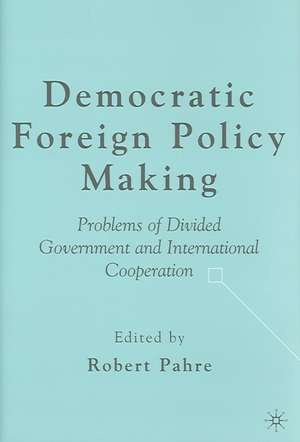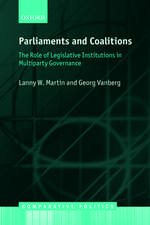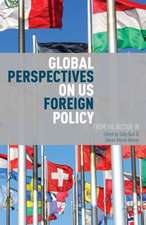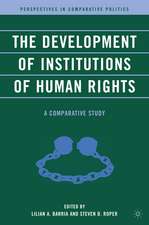Democratic Foreign Policy Making: Problems of Divided Government and International Cooperation
Editat de R. Pahreen Limba Engleză Hardback – 14 mar 2008
| Toate formatele și edițiile | Preț | Express |
|---|---|---|
| Paperback (1) | 381.50 lei 6-8 săpt. | |
| Palgrave Macmillan US – 14 mar 2008 | 381.50 lei 6-8 săpt. | |
| Hardback (1) | 384.36 lei 6-8 săpt. | |
| Palgrave Macmillan US – 14 mar 2008 | 384.36 lei 6-8 săpt. |
Preț: 384.36 lei
Nou
Puncte Express: 577
Preț estimativ în valută:
73.59€ • 75.49$ • 61.96£
73.59€ • 75.49$ • 61.96£
Carte tipărită la comandă
Livrare economică 26 februarie-12 martie
Preluare comenzi: 021 569.72.76
Specificații
ISBN-13: 9781403974570
ISBN-10: 1403974578
Pagini: 243
Ilustrații: XII, 243 p.
Dimensiuni: 140 x 216 x 19 mm
Greutate: 0.4 kg
Ediția:2006
Editura: Palgrave Macmillan US
Colecția Palgrave Macmillan
Locul publicării:New York, United States
ISBN-10: 1403974578
Pagini: 243
Ilustrații: XII, 243 p.
Dimensiuni: 140 x 216 x 19 mm
Greutate: 0.4 kg
Ediția:2006
Editura: Palgrave Macmillan US
Colecția Palgrave Macmillan
Locul publicării:New York, United States
Cuprins
Divided Government and International Cooperation: An Overview; R.Pahre Domestic Veto Institutions, Divided Government, and the Status Quo: A Spatial Model of Two-Level Games with Complete Information; T.H.Hammond & B.Prince Do Democracies Trade More Freely?; B.P.Rosendorff Divided Government and International Cooperation in the Nineteenth Century; R.Pahre Divided Government and the Ratification of the Amsterdam Treaty; S.Hug & T.König Divided Government and Territorial Disputes; T.Allee & P.Huth Conclusion: Democracy and Foreign Policy; R.Pahre
Recenzii
'The so-called Schelling conjecture, named after Nobel laureate Thomas Schelling, is a key proposition in the applied bargaining literature. This 'paradox of weakness' suggests that the weak negotiator is often more successful than its resourceful and unconstrained counterpart. This volume explores in an exemplary fashion the relevance of the Schelling conjecture and some related hypotheses on how democracies negotiate with other states and how successful they are at the bargaining table. The theoretical and empirical work presented by this truly international research team offers new challenges and is presented with hallmark rigor and sophistication. Their collective tour de force will shape the negotiation and cooperation literature for years to come.' - Gerald Schneider, University of Konstanz, and Executive Editor European Union Politics
Notă biografică
ROBERT PAHRE is Associate Professor of Political Science and Associate Director of the European Union Centre at the University of Illinois at Urbana-Champaign, USA.















